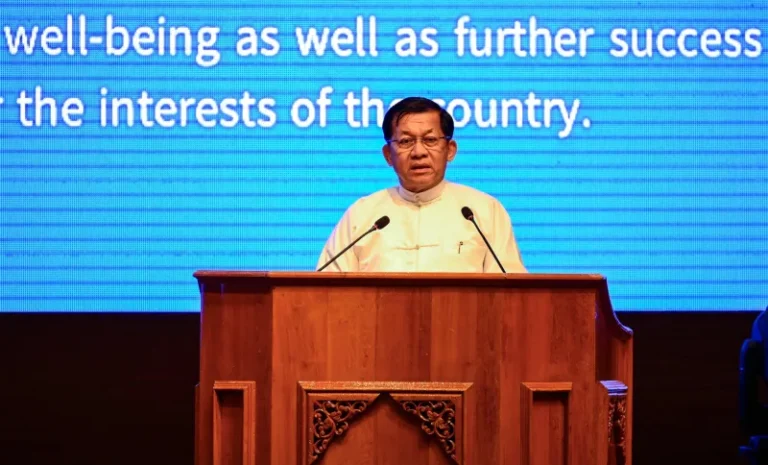
Myanmar Junta Admits Elections Won’t Be Nationwide Amid Intensifying Civil War
In a rare and revealing admission, Myanmar’s junta chief, Senior General Min Aung Hlaing, has conceded that the military-backed administration will not be able to hold nationwide elections as originally planned. The acknowledgment underscores the worsening state of Myanmar’s internal conflict, four years after the military seized power in a 2021 coup that toppled the elected government of Aung San Suu Kyi and plunged the nation into chaos.
The junta leader’s comments mark the first official recognition that the long-promised election—set to begin in late December 2025—will be partial and incomplete, further fueling skepticism about its legitimacy among opposition parties, Western governments, and international observers.
A Nation Still at War with Itself
Since the 2021 coup, Myanmar has been torn apart by one of the world’s most complex and brutal civil wars. Dozens of ethnic armed groups and pro-democracy militias, collectively referred to as the People’s Defense Forces (PDFs), now control significant portions of the country’s territory.
The military, officially known as the Tatmadaw, has lost ground in several regions, especially in Sagaing, Chin, Kayah, and Shan States, where local resistance forces and ethnic armies have seized towns, highways, and military outposts.
Amid this turmoil, Min Aung Hlaing’s government insists on pushing ahead with elections to present a façade of legitimacy, claiming that a transition to “disciplined democracy” remains the ultimate goal. However, even within military-controlled areas, the prospect of a free, fair, and nationwide election appears increasingly implausible.
A Public Admission of Limited Control
Speaking in a televised address from the capital Naypyitaw, Min Aung Hlaing admitted:
“We can’t hold the election everywhere 100%.”
He explained that by-elections would be conducted later in conflict zones once “stability and security” are restored. According to a December 2024 census report, the junta managed to carry out a full on-ground survey in only 145 out of 330 townships, leaving more than half of Myanmar’s regions outside effective government control.
The same report estimated Myanmar’s total population at 51.3 million, but many observers question the reliability of these figures, given the state’s limited access to rebel-held territories.
Barriers to Participation
The upcoming election—expected to begin on December 28, 2025, and continue in phases into January 2026—has been criticized for its restrictive eligibility rules that favor junta-aligned parties.
Under the Election Commission’s regulations, political parties must:
Register at least 50,000 members, and
Possess a minimum of 100 million kyat (approximately US$47,700) in assets.
These thresholds have effectively sidelined most opposition groups, leaving only six parties eligible to contest the elections on a national scale.
Major anti-junta movements, including the National League for Democracy (NLD)—the party of Aung San Suu Kyi—remain banned or have refused to participate. Dozens of smaller pro-democracy organizations have been dissolved, their leaders imprisoned or forced into exile.
Critics Call the Election a “Sham”
Critics inside and outside Myanmar have denounced the election as a “sham exercise” designed to whitewash military rule rather than restore civilian governance. Western governments, including the United States, United Kingdom, and members of the European Union, have already dismissed the planned polls as illegitimate under current conditions.
Analysts argue that any vote held under military supervision, amid widespread repression and violence, cannot reflect the true will of the people. According to Human Rights Watch, Myanmar’s military has continued to use airstrikes, arbitrary arrests, and internet shutdowns to stifle dissent and prevent organized political activity.
ASEAN’s Dilemma: Observers or Silence
The junta has formally invited members of the Association of Southeast Asian Nations (ASEAN) to send election observers, seeking to lend an air of credibility to the process. However, the 10-member regional bloc remains deeply divided on how to engage with Myanmar’s regime.
ASEAN, currently chaired by Malaysia, includes Brunei, Cambodia, Indonesia, Laos, the Philippines, Singapore, Thailand, and Vietnam. Despite multiple attempts to mediate peace under the Five-Point Consensus agreed in 2021, progress has been minimal.
Malaysia’s foreign minister, following a recent meeting with Min Aung Hlaing, emphasized the need for inclusive dialogue involving all stakeholders, including the National Unity Government (NUG) and ethnic organizations—something the junta continues to reject.
The upcoming ASEAN summit, expected later this month, will once again place Myanmar’s crisis at the center of discussions, though concrete action from the bloc remains uncertain.
The Broader Humanitarian Picture
Beyond the political crisis, Myanmar faces a deepening humanitarian catastrophe. The United Nations estimates that over 18 million people—nearly one-third of the population—now require humanitarian assistance, while more than 2.5 million have been internally displaced by fighting.
Neighboring countries, particularly Thailand and India, have seen thousands of refugees cross their borders seeking safety. The conflict has devastated livelihoods, disrupted trade, and crippled healthcare and education systems across vast areas of the country.
Rohingya Refugees at Risk of “Funding Cliff”
In parallel, the United Nations Children’s Fund (UNICEF) has raised alarm over dwindling resources for Rohingya refugees living in Bangladesh’s sprawling Cox’s Bazar camps. The agency warned that its ability to assist Rohingya children is rapidly collapsing due to a severe funding shortfall.
“A funding crisis is unfolding, and it’s threatening to erase years of progress for Rohingya children,” said Carla Haddad Mardini, UNICEF’s Chief of Private Fundraising and Partnerships, after returning from Bangladesh.
She warned that without renewed donor support, vital programs in education, nutrition, and child protection could vanish by 2026, leaving hundreds of thousands of displaced children vulnerable to malnutrition, exploitation, and disease.
The crisis highlights the international community’s growing fatigue with Myanmar’s prolonged instability, even as the needs of its most vulnerable populations continue to rise.
An Uncertain Future
Min Aung Hlaing’s admission, while unprecedented, offers little hope for genuine political reform. Analysts see it as an attempt to manage expectations and secure regional legitimacy rather than a step toward democratic restoration.
As conflict lines deepen, Myanmar risks fragmenting further into a patchwork of autonomous zones, controlled by ethnic armies and resistance forces. With economic collapse, international isolation, and ongoing war, the prospect of meaningful elections that reflect the will of Myanmar’s people remains remote.
Still, the junta continues to present its planned vote as a symbol of “stability and national unity”—a message few inside or outside the country appear to believe.
FAQ: Myanmar’s Upcoming Elections and Crisis
1. Why can’t Myanmar hold nationwide elections?
Large areas of Myanmar remain under control of resistance groups and ethnic armies, making it impossible for the military to safely organize polls in conflict zones. The junta has verified voter lists in only 145 of 330 townships.
2. When will the elections take place?
The general election is expected to start on December 28, 2025, and continue into January 2026, though many regions will not participate due to ongoing fighting.
3. Which political parties are allowed to run?
Only six political parties currently meet the junta’s strict membership and funding requirements. Major opposition parties, such as the National League for Democracy (NLD), remain banned.
4. What is ASEAN’s role in the election?
ASEAN has been invited to send observers, but its member states remain divided. Malaysia and Indonesia advocate for inclusive dialogue, while others prefer non-interference.
5. How does the international community view the elections?
Western nations and human rights groups view the polls as illegitimate, citing widespread repression, conflict, and the absence of democratic freedoms.
6. What is happening to Rohingya refugees?
UNICEF warns that aid for Rohingya children in Bangladesh is running out, threatening to undo years of humanitarian progress by 2026 unless funding resumes.
7. What does this mean for Myanmar’s future?
Without an inclusive peace process, Myanmar risks prolonged instability, deepening poverty, and further international isolation despite attempts to hold elections.
Related posts:
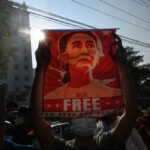 ASEAN Rejects Myanmar’s Military Elections, Illegitimate
ASEAN Rejects Myanmar’s Military Elections, Illegitimate
 Inle Lake Buddhist Festival in Myanmar | Tradition & Renewal
Inle Lake Buddhist Festival in Myanmar | Tradition & Renewal
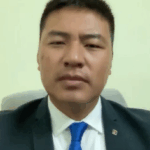 Dr. Sasa Resigns from NUG, Restructuring Expected Inside Shadow Government
Dr. Sasa Resigns from NUG, Restructuring Expected Inside Shadow Government
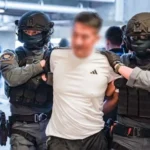 Thailand Extradites Shwe Kokko Tycoon She Zhijiang to China
Thailand Extradites Shwe Kokko Tycoon She Zhijiang to China
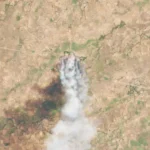 Myanmar Military Paraglider Strike Kills Dozens
Myanmar Military Paraglider Strike Kills Dozens
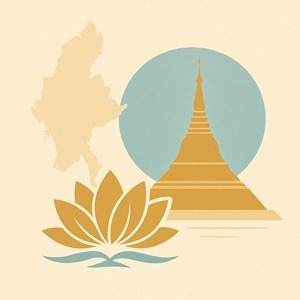 How Myanmar’s Gold Rush Puts International Rivers at Risk
How Myanmar’s Gold Rush Puts International Rivers at Risk
